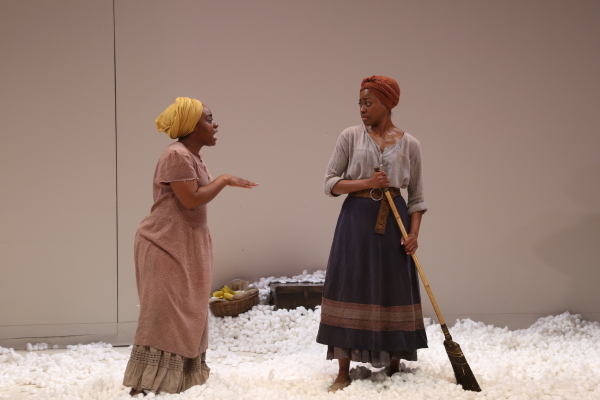An Octoroon

(© Gerry Goodstein)
A man in his underwear claiming to be a "black playwright" spends the first 10 minutes of Branden Jacobs-Jenkins' An Octoroon recalling a session with his therapist. Are you bored yet? Well, if you can hold out a little longer through this excessively self-aware moment, you're in for a very entertaining and thought-provoking night of theater.
Last spring's world premiere of An Octoroon at Soho Rep. left us gagging on cotton and swimming in a sea of undigested ideas about race and performance. Under the steady direction of Sarah Benson this Brooklyn transfer has much the same effect, but feels more refined than the unapologetically messy original. The stage is bigger and the fourth-act "sensation" is far more sensational. In case you don't know what a sensation is, the actors will explain it to you.
Jacobs-Jenkins has written himself into the script as the aforementioned black playwright, BJJ (Austin Smith). Dion Boucicault (Haynes Thigpen), one of America's forgotten stage luminaries, is also a character. Boucicault authored the 1859 drama The Octoroon, the basis of this new play. Concerning the sensation: "It's your last chance to really hit the audience with something big," Boucicault and BJJ explain. In the collegiate atmosphere of the theater's Polonsky Shakespeare Center, passages like these start to feel like a theater-history lecture. Die-hard drama nerds will undoubtedly find it all fascinating, but a lay audience might tune out, dismissing this as excessive navel-gazing. Luckily, there's always that "sensation" to pull us back in. Jacobs-Jenkins' sharp language and Boucicault's so-bad-it's-good story also help.
The play-within-a-play concerns George Peyton (Smith), the heir of Louisiana plantation Terrebonne. George's deceased uncle foolishly gambled away the richest half of the estate to mustachioed upstart Jacob M'Closky (also Smith), leaving the Peytons in financial trouble. Now M'Closkey is intent on purchasing the remaining estate at auction, including all the slaves. He's particularly interested in Zoe (Amber Gray), George's octoroon (one-eighth-black) cousin. Zoe thought she was freed by her white father (George's uncle), but a mortgage on the estate made her "free papers" null and void. Complicating matters, George is in love with Zoe. But if he were to marry wealthy admirer Dora (Mary Wiseman), he might save Terrebonne.
House slaves Minnie (Maechi Aharanwa) and Dido (Pascale Armand) comment on all this white-people drama, breaking it down as they sweep up a stage covered in cotton balls (wonderfully on-the-nose set by Mimi Lien). Aharanwa has spot-on comic timing and delivery for Minnie's lines, which are the funniest in the play. "I know we slaves and evurthang, but you are not your job," she advises Dido, adding, "You gotta take time out of your day to live life for you." This shout-out to self-help is just par for the course in a play where history and modernity awkwardly abut.
As the belligerently drunk Boucicault, Thigpen applies redface and warms up to Azealia Banks (sound design by Matt Tierney), flailing wildly across the stage. Ian Lassiter fearlessly portrays older slave Pete (leaning precariously on a cane) and young "pickaninny" Paul (with wide eyes and a broad grin). As both the hero and villain, Smith works up a sweat engaging in a strenuous duel with himself. The real BJJ hops around the stage during scene transitions as a kind of Br'er Rabbit-themed stagehand. Befitting the play's melodramatic tone, all the performances are scene-stealing and over-the-top, with Wiseman standing out as the biggest scenery-chewing ham of them all.
Wade Laboissonniere outfits Wiseman in frilly pastel pink and yellow. Hair and makeup designer Cookie Jordan dots her cheeks with far too much rouge. She looks like an Easter egg and speaks French like Helen Keller. There has never been a more ridiculous caricature of a Southern belle, and Wiseman leans into it wholeheartedly.
Jacobs-Jenkins compensates for his occasionally grating metatheatricality with a robust sense of frivolity and fun, which Benson stages with the panache of an insane choreographer. An Octoroon is full of the kind of exuberant irreverence that all too often feels absent from our current crop of experimental theater; it definitely makes this one worth seeing.










